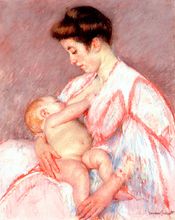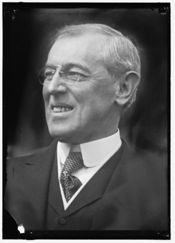Mother's Day U.S.: Difference between revisions
imported>Mary Ash No edit summary |
mNo edit summary |
||
| (21 intermediate revisions by 3 users not shown) | |||
| Line 1: | Line 1: | ||
{{subpages}} | {{subpages}} | ||
{{TOC|right}} | {{TOC|right}} | ||
{{Image|Cassatt Mary Baby John Being Nursed 1910.jpg|left|175px|The bond between mother and child is remembered on Mother's Day.}} | |||
'''Mother's Day''' is celebrated the second Sunday in May to honor mothers throughout America. The holiday was formally declared after [[Congress]] passed legislation May 8, 1914, requesting a proclamation declaring this date a national holiday. President [[Woodrow Wilson]] issued a proclamation on May 9, 1914, declaring the first national holiday. It was requested that American citizens fly the American flag to honor those mothers who lost sons in war action.<ref>{{cite web | url = http://memory.loc.gov/ammem/today/may09.html | title = The Library of Congress American Memory Today in History | accessdate = 2011-05-11 | date = 2011-05-11}}</ref> | |||
{{Image|Woodrow Wilson.jpg|right|175px|President Woodrow Wilson.}} | |||
==Origins== | |||
Mother's Day was started by women's peace groups after the Civil War. Women from both sides gathered together to honor the sons they had lost during the war. Several Mother's Day observances were held during the 1870s and 1880s all at the local level. By 1868 Ann Jarvis had created a committee to establish a "Mother's Friendship Day" to reunite families divided by the [[Civil War]]. She died in 1905 before seeing the holiday implemented by Wilson. Her daughter, also called Ann Jarvis, took up her mother's cause and with the help of a Philadelphia merchant, John Wanamaker, a Mother's Day service was held at Andrew's Methodist Episcopal Church in Grafton, West Virginia, on May 9, 1907, at the church where her mother had taught Sunday School. The first "official" Mother's Day service was held May 10, 1908, at Andrew's Methodist Episcopal Church, and there was a larger ceremony in the Wanamaker Auditorium in the Wanamaker's store in Philadelphia on the same day.<ref>{{cite web | url = http://books.google.com/books?id=z55xx8_P08UC&pg=PT714&dq=%22mother%27s+day%22+origin&lr=&as_brr=3#v=onepage&q&f=false | title = Google Books The Family in America, Vol 1, ISBN 13: 978-1576072325 | accessdate = 2011-05-11 | last = Joseph | first = Hawes | coauthors = Elizabeth Shores | date = 2011-05-11 | publisher = ABC-CLIO; 2 volume edition (December 1, 2001)}}</ref> | |||
Mother's Day | ==States celebrate Mother's Day== | ||
In 1910, [[West Virginia (U.S. state)|West Virginia]] declared Mother's Day an official holiday. Other U.S. states followed suit leading up to the federal declaration making Mother's Day an official federal holiday.<ref>{{cite web | url = http://books.google.com/books?id=z55xx8_P08UC&pg=PT714&dq=%22mother%27s+day%22+origin&lr=&as_brr=3#v=onepage&q&f=false | title = Google Books The Family in America, Vol 1, ISBN 13: 978-1576072325 | accessdate = 2011-05-11 | last = Joseph | first = Hawes | coauthors = Elizabeth Shores | date = 2011-05-11 | publisher = ABC-CLIO; 2 volume edition (December 1, 2001)}}</ref> | |||
==Previous attempts== | |||
Previous attempts to establish Mother's Day were done in the late 1800s by both [[Julia Ward Howe]] and [[Juliet Calhoun Blakeley]]. Howe held a Mother's Day anti-war observance in New York City on June 2, 1872. She issued a proclamation calling women to work for peace after seeing effects of war and attempted to use this by establishing a Mother's Day observance. Howe continued her efforts throughout the 1870s but never saw the holiday reach fruition. Howe was a known abolitionist and wrote the "[[Battle Hymn of the Republic]]".<ref> {{cite web | url = http://womenshistory.about.com/od/mothersday/a/jwh.htm | title = Mother's Day History | accessdate = 2011-11-11 | last = Lewis | first = Jone }}</ref>Juliet Calhoun Blakely, at least according to Albion legend, attempted to establish a permanent Nother's Day observance as an anti-temperance movement. It seems the Rev. Myron Daughterty's son and two temperance advocates were forced to become publicly drunk at a bar the night before the sermon. The Rev. Daugherty asked mothers to join the cause to stop drinking during his sermon. He was unable to complete the sermon, Blakely stepped in by requesting mothers join her in the temperance movement. Blakely's two sons vowed to return to Albion to honor her. Both of Blakely's sons were salesman and through their business contacts worked to establish a Mother's Day. By the early 1880s the Methodist Episcopal Church in Albion had established the second Sunday in May as a Mother's Day observance.<ref> {{cite web | url = http://www.albionmich.com/markers/amark01.htm | title = Albion Michigan Historical Markers Mother's Day | accessdate = 2011-11-11}}</ref> | |||
== Fraternal organizations == | |||
Frank Hering, past grand worthy president of the [[Fraternal Order of Eagles]], made a plea for establishing a national holiday to recognize mothers throughout the U.S. The idea of a "Mother's Day" was formulated while he a faculty member at Notre Dame. he observed students exchanging penny postcards with inscriptions honoring their mothers. Hering went onto to help establish the Fraternal Order of Eagles and worked to get "Mother's Day" established as a national U.S. holiday.<ref> {{cite web | url = http://www.annieshomepage.com/mothershistory.html | title = Annie's Mother's Day History Page | accessdate = 2011-05-12}}</ref><ref> {{cite web | url = http://www.foe.com/about-us/mothers-day.aspx | title = Fraternal Order of Eagles History of Mother's Day | accessdate = 2011-05-12}}</ref> | |||
==Carnations== | |||
[[Carnations]] have come to symbolize the flower given to mothers on Mother's Day. The red carnation is worn to honor mothers who are still alive while white carnations are worn to honor mothers who have passed on.<ref> {{cite web | url = http://www.annieshomepage.com/mothershistory.html | title = Annie's Mother's Day History Page | accessdate = 2011-05-12}}</ref> | |||
==Reference== | |||
<references></references>[[Category:Suggestion Bot Tag]] | |||
Latest revision as of 11:01, 21 September 2024
Mother's Day is celebrated the second Sunday in May to honor mothers throughout America. The holiday was formally declared after Congress passed legislation May 8, 1914, requesting a proclamation declaring this date a national holiday. President Woodrow Wilson issued a proclamation on May 9, 1914, declaring the first national holiday. It was requested that American citizens fly the American flag to honor those mothers who lost sons in war action.[1]
Origins
Mother's Day was started by women's peace groups after the Civil War. Women from both sides gathered together to honor the sons they had lost during the war. Several Mother's Day observances were held during the 1870s and 1880s all at the local level. By 1868 Ann Jarvis had created a committee to establish a "Mother's Friendship Day" to reunite families divided by the Civil War. She died in 1905 before seeing the holiday implemented by Wilson. Her daughter, also called Ann Jarvis, took up her mother's cause and with the help of a Philadelphia merchant, John Wanamaker, a Mother's Day service was held at Andrew's Methodist Episcopal Church in Grafton, West Virginia, on May 9, 1907, at the church where her mother had taught Sunday School. The first "official" Mother's Day service was held May 10, 1908, at Andrew's Methodist Episcopal Church, and there was a larger ceremony in the Wanamaker Auditorium in the Wanamaker's store in Philadelphia on the same day.[2]
States celebrate Mother's Day
In 1910, West Virginia declared Mother's Day an official holiday. Other U.S. states followed suit leading up to the federal declaration making Mother's Day an official federal holiday.[3]
Previous attempts
Previous attempts to establish Mother's Day were done in the late 1800s by both Julia Ward Howe and Juliet Calhoun Blakeley. Howe held a Mother's Day anti-war observance in New York City on June 2, 1872. She issued a proclamation calling women to work for peace after seeing effects of war and attempted to use this by establishing a Mother's Day observance. Howe continued her efforts throughout the 1870s but never saw the holiday reach fruition. Howe was a known abolitionist and wrote the "Battle Hymn of the Republic".[4]Juliet Calhoun Blakely, at least according to Albion legend, attempted to establish a permanent Nother's Day observance as an anti-temperance movement. It seems the Rev. Myron Daughterty's son and two temperance advocates were forced to become publicly drunk at a bar the night before the sermon. The Rev. Daugherty asked mothers to join the cause to stop drinking during his sermon. He was unable to complete the sermon, Blakely stepped in by requesting mothers join her in the temperance movement. Blakely's two sons vowed to return to Albion to honor her. Both of Blakely's sons were salesman and through their business contacts worked to establish a Mother's Day. By the early 1880s the Methodist Episcopal Church in Albion had established the second Sunday in May as a Mother's Day observance.[5]
Fraternal organizations
Frank Hering, past grand worthy president of the Fraternal Order of Eagles, made a plea for establishing a national holiday to recognize mothers throughout the U.S. The idea of a "Mother's Day" was formulated while he a faculty member at Notre Dame. he observed students exchanging penny postcards with inscriptions honoring their mothers. Hering went onto to help establish the Fraternal Order of Eagles and worked to get "Mother's Day" established as a national U.S. holiday.[6][7]
Carnations
Carnations have come to symbolize the flower given to mothers on Mother's Day. The red carnation is worn to honor mothers who are still alive while white carnations are worn to honor mothers who have passed on.[8]
Reference
- ↑ The Library of Congress American Memory Today in History (2011-05-11). Retrieved on 2011-05-11.
- ↑ Joseph, Hawes; Elizabeth Shores (2011-05-11). Google Books The Family in America, Vol 1, ISBN 13: 978-1576072325. ABC-CLIO; 2 volume edition (December 1, 2001). Retrieved on 2011-05-11.
- ↑ Joseph, Hawes; Elizabeth Shores (2011-05-11). Google Books The Family in America, Vol 1, ISBN 13: 978-1576072325. ABC-CLIO; 2 volume edition (December 1, 2001). Retrieved on 2011-05-11.
- ↑ Lewis, Jone. Mother's Day History. Retrieved on 2011-11-11.
- ↑ Albion Michigan Historical Markers Mother's Day. Retrieved on 2011-11-11.
- ↑ Annie's Mother's Day History Page. Retrieved on 2011-05-12.
- ↑ Fraternal Order of Eagles History of Mother's Day. Retrieved on 2011-05-12.
- ↑ Annie's Mother's Day History Page. Retrieved on 2011-05-12.

